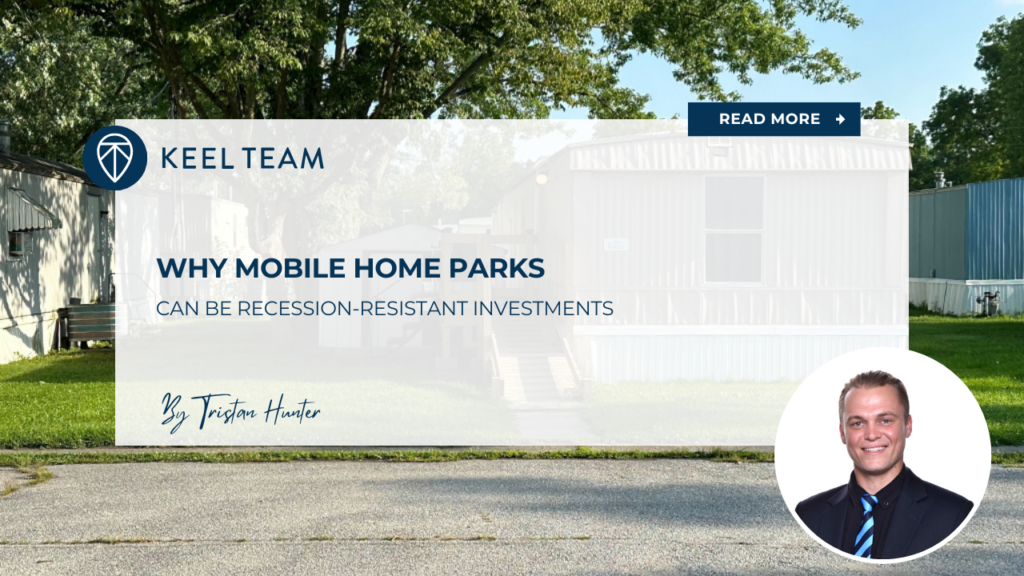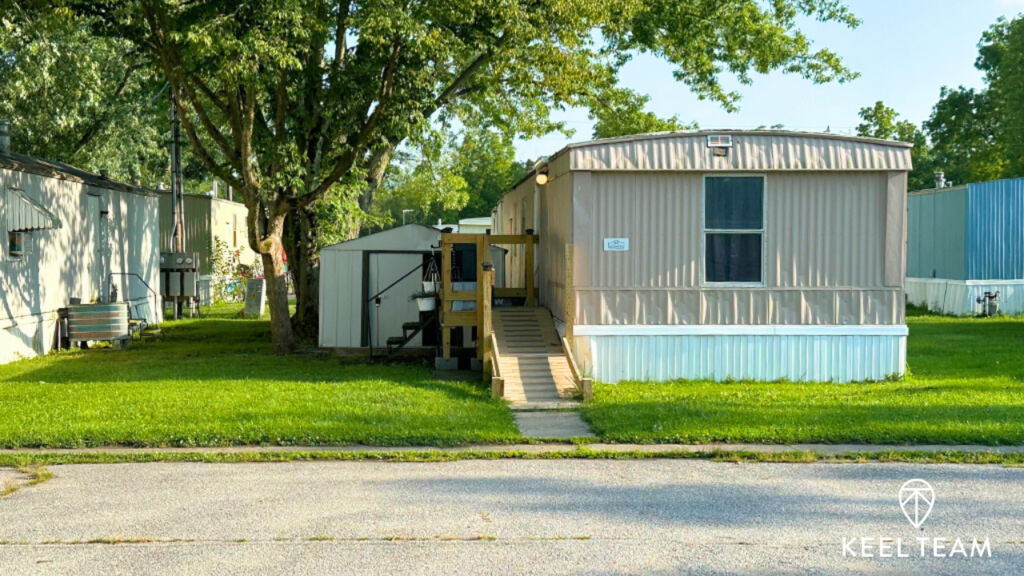Why Mobile Home Parks Can Be Recession-Resistant Investments
-
 Tristan Hunter - Investor Relations
Tristan Hunter - Investor Relations

Economic downturns often bring uncertainty to investors. However, some asset classes perform relatively well even during recessions. Mobile home parks may offer unique advantages that appeal to those seeking stability in volatile markets. While there are no recession-resistant investments, mobile home parks have features that often set them apart. Here’s a closer look at why mobile home parks can remain strong during economic downturns and how they compare to other types of real estate investments.
Affordable Housing Demand Remains Strong
Economic challenges often increase the demand for affordable housing. Mobile home parks typically cater to residents seeking low-cost living options. When unemployment rises or wages stagnate, people tend to downsize. Mobile home parks may provide an affordable alternative to apartments or traditional homes. As a result, mobile home park occupancy rates often remain recession-resistant investments during economic downturns.
Unlike luxury apartments or high-end commercial spaces, mobile home parks serve a market segment that typically grows in tough times. This demand can make mobile home parks less vulnerable to economic fluctuations compared to other asset classes.
Low Turnover and High Tenant Stability
Mobile home parks can attract long-term tenants. Residents in mobile home parks often own their homes but lease the land. Moving a mobile home can be expensive and logistically challenging. This dynamic may reduce tenant turnover, even during a recession.
In contrast, multifamily properties or commercial real estate might see higher vacancy rates as tenants look for cost savings. Office spaces and retail units can struggle to retain tenants during downturns, especially if businesses cut costs or close entirely.
Download our FREE eBook on the Top 20 things to know BEFORE investing in mobile home parks!
Comparatively Lower Operating Costs
Mobile home parks generally have lower operating costs than multifamily properties or commercial real estate. Owners are usually responsible for maintaining the land, utilities, and shared amenities. However, tenants are typically responsible for maintaining their individual homes.
This cost-sharing structure can create a buffer for mobile home park owners during a recession. By comparison, multifamily property owners must often maintain units, handle repairs, and address tenant concerns directly. Commercial real estate owners might face significant expenses from tenant improvements or maintenance contracts.
Consistent Cash Flow
Mobile home parks may offer more predictable cash flow than some other investments. Because residents own their homes, they are less likely to default on rent payments. The cost of renting a mobile home lot is often much lower than apartment rents, making it an affordable expense even in tight financial conditions.
By contrast, traditional commercial real estate cash flow can be more volatile during recessions. Vacant office spaces or retail units can significantly impact income. Multifamily properties might also experience cash flow issues if tenants struggle to pay higher rents.
Comparisons with Multifamily Properties
Multifamily real estate and mobile home parks both serve housing needs, but their performance during recessions can differ. Multifamily properties often appeal to middle-income renters. However, economic downturns can lead to higher vacancy rates in these properties if renters move to more affordable options.
Mobile home parks, on the other hand, typically cater to lower-income individuals or retirees on fixed incomes. This demographic may experience less fluctuation in housing needs. Additionally, the cost to rent a mobile home lot is usually much lower than apartment rents, making it an attractive option during tough economic times.
Comparisons with Commercial Real Estate
Traditional commercial real estate can struggle during recessions due to reduced consumer spending and changes in business operations. Retail spaces may see closures as companies cut back, and office buildings might face challenges with remote work trends.
Mobile home parks, however, operate in the residential space, which tends to be more stable. Housing remains a necessity regardless of economic conditions. This fundamental demand can make mobile home parks less susceptible to market downturns than office or retail spaces.
Opportunities for Value-Add Strategies
Mobile home parks also offer opportunities for value-add investments. By improving infrastructure, adding amenities, or optimizing management, owners can increase revenue potential. These strategies can be effective even in economic downturns, as residents may value a well-maintained community and be willing to pay slightly higher lot rents for enhanced services.
In contrast, value-add strategies in traditional commercial real estate or multifamily properties often involve larger capital expenditures. These projects may be riskier during a recession when tenant demand or revenue streams are less predictable.

Limited Supply and Growing Demand
The supply of mobile home parks is relatively limited. Many municipalities discourage the development of new mobile home parks due to zoning restrictions. At the same time, demand for affordable housing continues to grow. This imbalance may create favorable conditions for mobile home park owners during economic downturns.
Multifamily properties and traditional commercial real estate, by contrast, often face competitive markets with higher supply. New apartment complexes or office buildings can create oversupply issues, further challenging their recession-resistant qualities during economic downturns.
Scalability and Portfolio Diversification
Mobile home parks can be scaled to fit an investor’s goals. Some mobile home parks have a small number of lots, while others have hundreds. This flexibility allows investors to diversify their portfolios without overextending resources.
Adding mobile home parks to a portfolio can provide balance during recessions. Traditional commercial real estate and multifamily properties might see declines, but mobile home parks usually remain stable. This diversification can help mitigate overall investment risk.
Potential Risks to Consider
While mobile home parks offer many advantages, they are not without risks. Investors should be aware of potential challenges, such as:
- Regulatory Changes: Zoning laws or rent control policies can impact revenue.
- Deferred Maintenance: Older mobile home parks may require significant upgrades.
- Tenant Issues: Managing tenant relationships and addressing disputes can be time-consuming.
These risks underscore the importance of conducting thorough due diligence before investing in a mobile home park. Working with experienced operators can help mitigate some of these challenges.
Partnering with Experienced Operators
First-time investors may benefit from partnering with experienced mobile home park operators. These professionals often have established systems for managing properties, addressing tenant concerns, and navigating regulatory issues. Their expertise can help maximize return potential and minimize risks.
Partnering with an operator also allows investors to take a more passive role. This can be especially valuable for those looking to diversify their portfolio without managing day-to-day operations.
Final Thoughts
Mobile home parks are not immune to economic challenges, but they possess qualities that can make them more recession-resistant investments. Strong demand for affordable housing, low operating costs, and consistent cash flow are just a few reasons why mobile home parks remain attractive investments.
When compared to multifamily properties or traditional commercial real estate, mobile home parks often demonstrate greater stability. However, potential investors should carefully evaluate the risks and consider working with experienced operators to ensure success.
As with any investment, understanding the nuances of mobile home park ownership can be key to making informed decisions. While no investment can guarantee returns, mobile home parks may offer a reliable option for those seeking recession-resistant investments.
Are you looking for MORE information? Book a 1-on-1 consultation with Andrew Keel to discuss:
- A mobile home park deal review
- Due diligence questions
- How to raise capital from investors
- Mistakes to avoid, and more!
Disclaimer:
The information provided is for informational purposes only and is not investment advice or a guarantee of any kind. We do not guarantee profitability. Make investment decisions based on your own research and consult registered financial and legal professionals. We are not registered financial or legal professionals and do not provide personalized investment recommendations.

Tristan Hunter - Investor Relations
View The Previous or Next Post
Subscribe Below 👇





